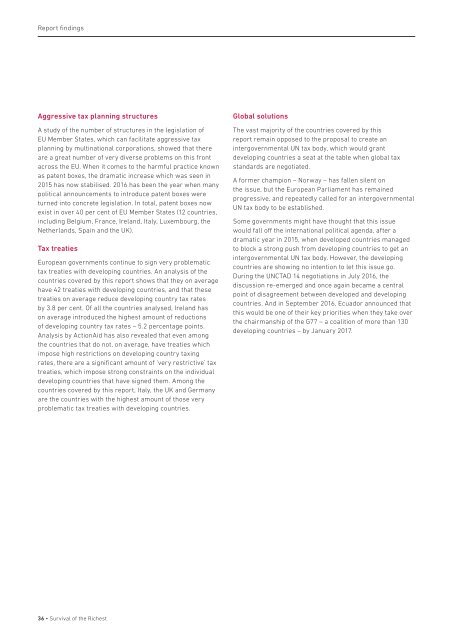You also want an ePaper? Increase the reach of your titles
YUMPU automatically turns print PDFs into web optimized ePapers that Google loves.
Report findings<br />
Aggressive tax planning structures<br />
A study <strong>of</strong> <strong>the</strong> number <strong>of</strong> structures in <strong>the</strong> legislation <strong>of</strong><br />
EU Member States, which can facilitate aggressive tax<br />
planning by multinational corporations, showed that <strong>the</strong>re<br />
are a great number <strong>of</strong> very diverse problems on this front<br />
across <strong>the</strong> EU. When it comes to <strong>the</strong> harmful practice known<br />
as patent boxes, <strong>the</strong> dramatic increase which was seen in<br />
2015 has now stabilised. 2016 has been <strong>the</strong> year when many<br />
political announcements to introduce patent boxes were<br />
turned into concrete legislation. In total, patent boxes now<br />
exist in over 40 per cent <strong>of</strong> EU Member States (12 countries,<br />
including Belgium, France, Ireland, Italy, Luxembourg, <strong>the</strong><br />
Ne<strong>the</strong>rlands, Spain and <strong>the</strong> UK).<br />
Tax treaties<br />
European governments continue to sign very problematic<br />
tax treaties with developing countries. An analysis <strong>of</strong> <strong>the</strong><br />
countries covered by this report shows that <strong>the</strong>y on average<br />
have 42 treaties with developing countries, and that <strong>the</strong>se<br />
treaties on average reduce developing country tax rates<br />
by 3.8 per cent. Of all <strong>the</strong> countries analysed, Ireland has<br />
on average introduced <strong>the</strong> highest amount <strong>of</strong> reductions<br />
<strong>of</strong> developing country tax rates – 5.2 percentage points.<br />
Analysis by ActionAid has also revealed that even among<br />
<strong>the</strong> countries that do not, on average, have treaties which<br />
impose high restrictions on developing country taxing<br />
rates, <strong>the</strong>re are a significant amount <strong>of</strong> ‘very restrictive’ tax<br />
treaties, which impose strong constraints on <strong>the</strong> individual<br />
developing countries that have signed <strong>the</strong>m. Among <strong>the</strong><br />
countries covered by this report, Italy, <strong>the</strong> UK and Germany<br />
are <strong>the</strong> countries with <strong>the</strong> highest amount <strong>of</strong> those very<br />
problematic tax treaties with developing countries.<br />
Global solutions<br />
The vast majority <strong>of</strong> <strong>the</strong> countries covered by this<br />
report remain opposed to <strong>the</strong> proposal to create an<br />
intergovernmental UN tax body, which would grant<br />
developing countries a seat at <strong>the</strong> table when global tax<br />
standards are negotiated.<br />
A former champion – Norway – has fallen silent on<br />
<strong>the</strong> issue, but <strong>the</strong> European Parliament has remained<br />
progressive, and repeatedly called for an intergovernmental<br />
UN tax body to be established.<br />
Some governments might have thought that this issue<br />
would fall <strong>of</strong>f <strong>the</strong> international political agenda, after a<br />
dramatic year in 2015, when developed countries managed<br />
to block a strong push from developing countries to get an<br />
intergovernmental UN tax body. However, <strong>the</strong> developing<br />
countries are showing no intention to let this issue go.<br />
During <strong>the</strong> UNCTAD 14 negotiations in July 2016, <strong>the</strong><br />
discussion re-emerged and once again became a central<br />
point <strong>of</strong> disagreement between developed and developing<br />
countries. And in September 2016, Ecuador announced that<br />
this would be one <strong>of</strong> <strong>the</strong>ir key priorities when <strong>the</strong>y take over<br />
<strong>the</strong> chairmanship <strong>of</strong> <strong>the</strong> G77 – a coalition <strong>of</strong> more than 130<br />
developing countries – by January 2017.<br />
36 • <strong>Survival</strong> <strong>of</strong> <strong>the</strong> <strong>Richest</strong>


